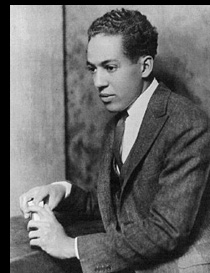
Langston Hughes, Writer, 65
May 23, 1967
By THE NEW YORK TIMES

|
Langston Hughes, Writer, 65 |
|
May 23, 1967 |
|
|
By THE NEW YORK TIMES |
|
Langston Hughes, the noted writer of novels, stories, poems and plays about Negro life, died last night in Polyclinic Hospital at the age of 65.
Mr. Hughes was sometimes characterized as the "O. Henry of Harlem." He was an extremely versatile and productive author who was particularly well known for his folksy humor.
In a description of himself written for "Twentieth Century Authors, a biographical dictionary, Mr. Hughes wrote:
"My chief literary influences have been Paul Laurence Dunbar, Carl Sandburg and Walt Whitman. My favorite public figures include Jimmy Durante, Marlene Dietrich, Mary McLeod Bethune, Mrs. Franklin D. Roosevelt, Marian Anderson and Henry Armstrong." "I live in Harlem, New York City," his autobiographical sketch continued. "I am unmarried. I like 'Tristan,' goat's milk, short novels, lyric poems, heat, simple folk, boats and bullfights; I dislike 'Aida,' parsnips, long novels, narrative poems, cold, pretentious folk, buses and bridges."
It was said that whenever Mr. Hughes had a pencil and paper in his hands, he would scribble poetry. He recalled an anecdote about how he was "discovered" by the poet Vachel Lindsay.
Lindsay was dining at the Wardman Park Hotel in Washington when a busboy summoned his courage and slipped several sheets of paper beside the poet's plate. Lindsay was obviously annoyed, but he picked up the papers and read a poem titled "The Weary Blues."
As Lindsay read, his interest grew. He called for the busboy and asked, "Who wrote this!"
"I did," replied Langston Hughes.
Lindsay introduced the youth to publishers who brought out such works by the rising poet and author as "Shakespeare in Harlem," "The Dream Keeper," "Not Without Laughter, "The Ways of White Folks," "The Big Sea" and "Popo And Fifina" as well as the initial "The Weary Blues."
"My writing," Mr. Hughes said, "has been largely concerned with the depicting of Negro life in America."
He also translated the poems of Negro writers in Cuba and Haiti because, Mr. Hughes noted, one of his main interests was "the encouragement of literary ability among colored writers."
In one of his many anecdotes Mr. Hughes explained how he became a poet when he was named "class poet" in grammar school in Lincoln, Ill.
"I was a victim of a stereotype," he observed wryly. "There were only two of us Negro kids in the whole class and our English teacher was always stressing the importance of rhythm in poetry.
"Well, everybody knows--except us--that all Negroes have rhythms, so they elected me class poet. I felt I couldn't let my white classmates down, and I've been writing poetry ever since."
James Langston Hughes, who dropped his first name, was born in Joplin, Mo., on Feb. 1, 1902. His mother was a school teacher and his father was a storekeeper.
After his graduation from Central High School to Cleveland, he went to Mexico and then attended Columbia University for a year. Mr. Hughes held a variety of jobs, including seaman on trips to Europe and Africa, cook in a Montmartre nightclub in Paris and then busboy at the Washington hotel wherehe presented his poetry to Lindsay.
His first book, "The Weary Blues," was published by Alfred A. Knopf in 1925.
A scholarship then enabled him to complete his education at Lincoln University, from which he graduated in 1929.